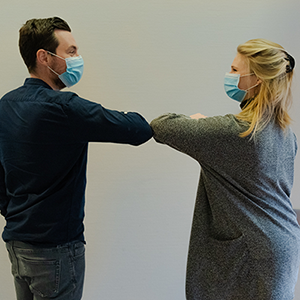
This approach involves developing cost-effective and accessible medical technologies that cater to resource-limited settings.
The centre's frugal biodesign strategy prioritises affordability, efficiency, sustainability, and user-friendliness.
By utilising local resources and expertise, UCT MedTech creates medical technologies specifically tailored to address the unique healthcare challenges faced by communities in Africa and other resource-limited regions.
This approach aligns with several SDGs, including SDG 3 (Good Health and Well-being), SDG 9 (Industry, Innovation and Infrastructure), and SDG 10 (Reduced Inequalities).
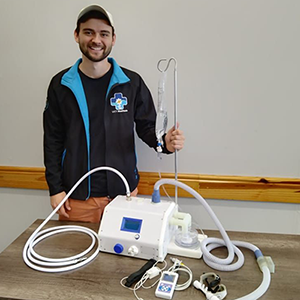
Through their frugal biodesign efforts, UCT MedTech significantly contributes to social responsibility and sustainable development.
Their development of affordable and accessible medical technologies helps diminish health disparities and enhances healthcare outcomes for individuals in need.
Covid-19 Rapid Response Initiatives
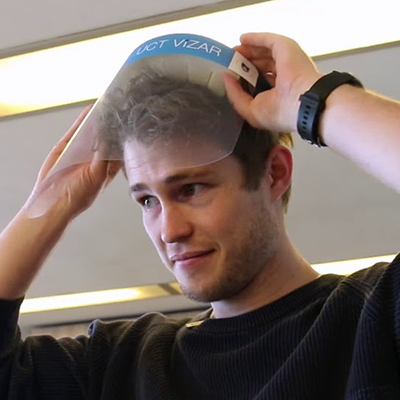
UCT ViZAR is an innovative personal protective equipment (PPE) designed to address the need for increased protection against COVID-19, especially for healthcare professionals in close contact with infected individuals. With limited space in South African hospitals and the highly infectious nature of the virus, clinicians require effective measures to prevent respiratory droplet transmission.
The World Health Organization (WHO) recommends eye protection and safeguarding mucous membranes to reduce the risk of infection. Current solutions include face visors or goggles combined with respiratory protection such as masks or respirators. However, there is a demand for cost-effective and user-friendly PPE.
The UCT ViZAR, along with other foam and transparent designs like the BAUER face mask and Corran face shield, meets this demand. These designs are easy to manufacture, cost-effective, and provide effective protection. The UCT ViZAR is undergoing approval from the South African Health Products Regulatory Authority (SAHPRA). It comes in two forms: a smaller shield size for non-clinical use and a larger clinical visor.
The UCT ViZAR offers several advantages, including easy assembly, quick production time (approximately 5 minutes per device), on-site manufacturing capability, and complete disposability. Furthermore, producing UCT ViZARs presents an opportunity for local job creation.
During the COVID-19 pandemic, the centre produced over 55,000 of these Vizars and distributed them across South Africa.
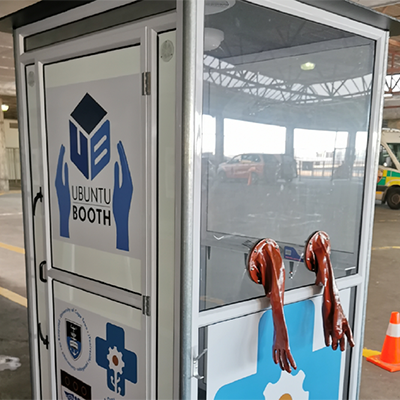
The concept of ubuntu, as defined by Archbishop Desmond Tutu, emphasises the interconnectedness of humanity. It acknowledges that a person's humanity is intimately tied to the humanity of others. Building upon this principle, a team of academics at the University of Cape Town (UCT) has developed a remarkable solution to protect healthcare workers at the forefront of the COVID-19 pandemic.
Known as the Ubuntu Booth, this innovative testing station is specifically designed to safeguard healthcare workers who collect COVID-19 samples. The booth ensures that there is no direct contact between the healthcare worker and the patient, eliminating the risk of infection. The Ubuntu Booth was engineered and created by Associate Professor Sudesh Sivarasu and Tertius de Villiers from UCT's Medical Devices Lab in collaboration with Professor Stephen Roche, Professor Michael Held, and Robyn Waters from the Division of Orthopaedic Surgery at Groote Schuur Hospital.
Healthcare workers often need to be in close proximity to patients when obtaining a COVID-19 sample by swabbing the nose or throat. This close contact can irritate the patient and potentially lead to coughing or sneezing, which poses a significant risk to healthcare workers due to the aerosolisation of the virus. To address these challenges, the Ubuntu Booth has been constructed using readily available materials, featuring aluminium frames and Perspex windows. The acrylic panels act as a highly protective barrier between the healthcare worker and the patient, minimising the chances of infection from droplets or aerosols.
The lightweight and freestanding design of the booths allows for easy deployment in various settings, including outdoor drive-through testing stations. The booths are built to withstand adverse weather conditions and offer complete protection for healthcare workers during sample collection.
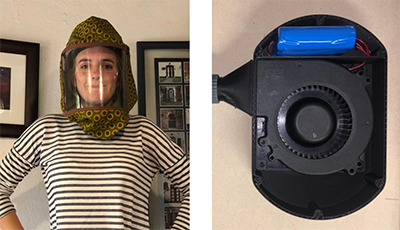
The UCT PeRSo PPE (Personal Respirator for Healthcare Professionals Treating COVID-19) is a collaborative development between the University of Cape Town and the University of Southampton. Designed to be worn continuously for 8-9 hours, the PeRSo prototype prioritises safety and comfort. Its lightweight design and placement of the fan away from the user's head ensure a comfortable experience.
The UCT PeRSo utilises off-the-shelf components, making it cost-effective and efficient. Notably, the system incorporates an adapter for standard filters or masks, which are used in conjunction with the suction pump. This unique feature further enhances affordability and overall efficiency.

Floq Swabs & Mask Supports are innovative products designed to enhance COVID-19 testing and mask-wearing experiences. Floq Swabs are specially engineered for reliable and efficient sample collection during COVID-19 testing. These swabs feature a unique flocked design that improves the collection and release of biological specimens, ensuring accurate test results. The superior collection capabilities of Floq Swabs make them a preferred choice for healthcare professionals and testing laboratories. Mask Supports, on the other hand, provide valuable assistance in improving the comfort and efficacy of mask usage. These supports are designed to be worn under masks, providing a secure and snug fit on the face. By preventing the mask from slipping or causing discomfort, Mask Supports enhance user compliance with mask-wearing protocols, ensuring proper protection against respiratory droplets.
Both Floq Swabs and Mask Supports are innovative solutions that contribute to the overall effectiveness of COVID-19 prevention and testing strategies.
UCT's Open Air is a simplified Continuous Positive Airway Pressure (CPAP) solution that was proposed to the National Ventilator Project (NVP). This innovative technology has the potential to be adapted into a home-based solution, offering a cost-effective and accessible option for patients in need of respiratory support. OpenAir was a strong contender throughout the NVP bid process, reaching the final round of consideration.
UCT plays a vital role as the clinical partner for the Council for Scientific and Industrial Research (CSIR), which was successful in securing their bid to the NVP. The collaboration between UCT and CSIR demonstrates the dedication and expertise of both institutions in developing advanced healthcare solutions for the benefit of patients and the broader community.
